March: 'Dual Confusion'
The country is in disarray. The last vestiges of monarchic rule will die as soon as Nicholas abdicates on March 15, as the Grand Duke Mikhail Alexandrovich refuses to take over.
Pessimism for the war abroad among Russian Army ranks is strong, but even more palpable back home in Petrograd where, as one observer put it, it resembles a “mass psychosis.” It is no different among the striking civilians: the Putilov Factory’s shuttering leaves 36,000 people without jobs.
Bread shortages are also on the rise, leading to crime and looting of bakeries, the Moscow Newsletter reports. A card ration system for bread and flour is introduced.
But Russia needs rulers. That spring, the Revolutionaries, with their philosophy of the ‘black redistribution of land,’ reign supreme. However, two parallel governments emerge: the Provisional Government – formed on the ashes of the Council of Ministers; and later, the Petrograd Soviet (Petrosoviet), formed earlier in what used to be St. Petersburg, but gaining new traction as a means of mediating between the Central Workers’ Group and the Central Military-Industrial Committee in Petrograd. It is full of resent for the official rulers, and is behind much of the chaos and demonstrations taking place. A period of so-called Dvoyevlastitye – or Dual Rule – begins.
The Petrosovet’s decision-making, by some accounts, leads to the collapse of the Russian military – a process started in the final days of February, and culminating with Order No. 1 – a decree that would compel soldiers to obey the Provisional Government only if its orders did not contradict the Petrosoviet’s. But crucially, it allowed the recently mutinying soldiers to pick their own unit committees and representatives. It did not apply to soldiers on the front lines, however – only off-duty ones.
Days later, Nicholas II abdicates.
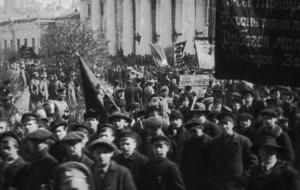
March 6, 1917
Unrest in Petrograd due to increasing bread shortages. After standing in line for bread for many hours in the winter cold and getting nothing, people start breaking into bakeries and bread shops. The looting starts on the Petrograd Side and quickly spreads onto other parts of the city. Crowds roam the streets chanting demands for bread.
The Moscow Newsletter
The Black Board
Bakery Owner A.I. Dekshen’ to Be Deported from Moscow
A.I. Dekshen’, owner of a bakery and bread shop located at the Kashin house on 2nd Sokolnicheskaya Street was sentenced to a prison sentence yesterday by the City Governor for selling wholesale, under the counter, flour that had been distributed exclusively for baking bread. Once he has served his sentence, Dekshen has been ordered out of Moscow by the governor for the duration of martial law.
Theater and Music
The Salomonsky Circus
The house was full last night at the Salomonsky Circus as the comedians Bim and Bom elicited endless applause from the audience with their poignant, topical songs. Their performance was a great success.
Courtroom News
Rotten Shoes
Moscow resident Mrs. Sakharova purchased a pair of shoes for her teenage son at the Pogrebov & Yegorov shoe shop at Lubyanka for the price of 21 rubles three months ago. Within just a few days of use, a whole appeared in one of the soles. The sole turned out to be made of paper. Mrs. Sakharova went to the shop to demand an explanation. The shop offered to have the sole replaced, but she turned it down and filed a complaint to the City Governor. The governor ordered to have the shop manager, Mr. Osipov, arrested, but later cancelled the arrest after he was presented with an explanation. (…)
Mrs. Sakharova sued the company for a refund, and the company returned her the money a few weeks ahead of the trial. Yesterday, a magistrates’ court examined the case against the shop’s stock manager L.S. Pogrebova, who stood accused of consumer fraud. (…)
The defense summoned an expert who testified that the soles of the shoes purchased by Mrs. Sakharova actually weren’t made of paper. Paper was indeed part of it, meant to preserve the shoes from getting worn out too fast and make them less squeaky, but the soles were made of leather, although of poor quality. The expert stressed that better-quality leather was impossible to supply these days. The magistrate accepted this testimony and acquitted Ms. Pogrebova.
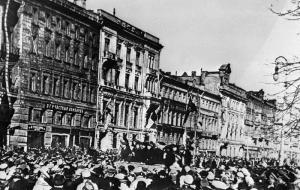
March 7, 1917
Emperor Nicholas II decides to leave the capital amidst reports of growing unrest. The royal train departs Petrograd and heads for the Stavka (Supreme Commander-in-Chief’s Headquarters) in Mogilev. On the eve of his departure, Nicholas meets with Minister of the Interior Nikolay Protopopov, who assures him the unrest poses no real danger.
As negotiation stall with the organizers of the March 3rd strike at the Putilov Plant, Petrograd’s major arms production facility, the management imposes a lockout. The plant suspends its operations for an indefinite term. Thirty-six thousand workers are left with no pay, no workplace, and no military draft exemption.
In Mesopotamia, British and Indian troops begin a push to overtake Baghdad, starting from a foothold on the outskirts of the city by the River Diyala.
The Moscow Newsletter
Moscow Introduces Ration Cards for Bread and Flour
Commander of the Moscow Military District General of the Artillery I.I. Mrozovsky issued the following order:
For purposes of regulating bread and flour trade, and ensuring a more even distribution of these products among all residents of Moscow, I hereby impose ration cards for bread and flour on the following conditions:
1. Bread and flour shall be sold against ration cards.
2. Ration cards authorizing purchase of bread or flour in Moscow shall be issued on orders from the Moscow City Governor.
3. Each ration card warrants buying bread or flour in Moscow in quantities determined by the Moscow City Governor based on the current stock of flour. Such rations shall be announced in the City Government’s Bulletin, and by way of special notices posted in the vicinity of bread shops.
4. Selling prices on bread and flour shall be determined by a local Food Board, and approved by the City Governor.
5. A regulation regarding the use of ration cards for bread and flour, as well as all other acts regarding the ration card system shall be issued by a decree of the Moscow City Governor.
March 8, 1917
Petrograd witnesses massive demonstration in celebration of the Women’s Day (The Day of Working Women), operation of many factories and manufactories is suspended and the worker from suburbs are heading in columns to the city center. First clashes with the military and Cossacks are reported.
In the evening, military and police authorities of Petrograd held a meeting which was presided over by General Sergey Khabalov, head of the Petrograd military command. The military are instructed to ensure order in the city.
Fight for Baghdad continues in Mesopotamia.
The Tsar’s train arrives to Mogilev.
The Moscow Newsletter
Rumors and Legends
In the times of many trials men tend to flounder, susceptible to every fudge, rumour or superstition…
People on the home front feel depressed because of all the hardships they have to endure; they are sponging facts and fiction alike.
That is the reason for all rumors, political gossips and inconceivable legends which are being eagerly consumed by lay minds.
Legends come in greatest abundance.
Even today the streets of Moscow are flooded with boys who jump on trams with some leaflets in their hands shouting: “Truthful divination on the early end of war!...5 kopecks!
When you read this “Truthful divination for 5 kopeck” you can clearly imagine that “diviner” as he sits in an insanitary tea-house somewhere on the outskirts of the city. A small bottle of cheapest vodka made from spirit lacquer sticks out from his pocket and on the table at which he seats there are two cups of tea and a greasy piece of paper that he fills with his eager but hardly literate hand.
It is most affronting that out of two million people living in Moscow some ingenuous public is sure to fall victim to these lies and they would try to convince others in similar kinds of nonsenses.
**
Proclamation
An egg is dearest at Easter;
These words are closest to those in cold-earth trenches on the forefronts, who find themselves under heavy shelling and a hail of lead with poisonous gas spreading around.
For people on the frontline any kind of gift would be dear, would it be a dyed egg or anything else for Easter, but most relevant for a soldier would be something to smoke. Day and night you can hear a soldiers’ saying that who tobacco can always make your day. And there is no cheer in marching if a soldier has not got a single piece to smoke!
From the very onset of war, Moscow Tobacco Committee has been supplying our heroes with tobacco, paper, warm fufaikas and pouches for various soldier paraphernalia, and even cinemaphotographs.
All these gifts are delivered directly to the forefront, to the soldiers in the trenches with the help of Committee members who hand the presents out to valiant warriors amid heavy pounding around.
On the occasion of the Great Easter holiday the Committee once again calls upon all kindly hearts to help with the supply of tobacco and gifts to our fighting heroes.
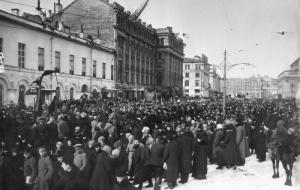
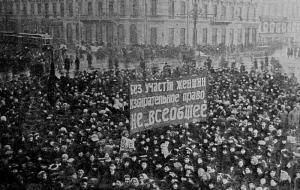
March 11, 1917
All-out strike continues in Petrograd (it started on the 9th of March (the 24th of February) and involves 306,000 people from 438 factories), massive demonstrations and clashes with the military have been ongoing for some days already. Barricades are being installed in the industrial outskirts of the city. All bridges are raised but demonstrators still manage it to the city by walking over the frozen Neva river. Some 150 people are reported to have died as a result of clashes with police. Mikhail Rodzianko, Chairman of the State Duma, writes a telegram to Emperor Nicholas II informing him of the anarchy in the capital. Late in the evening another telegram from Rodzianko comes to the General Headquarters with a request to “form a government that would enjoy the trust of the whole population.”
At its gathering The Holy Synod refuses to urge orthodox laymen not to take part in any disorders or demonstrations.
Moscow Newsletter
Eatery closed
Yesterday, upon Mayor’s instruction the Baciashvili’s eatery, situated at 21, Petrovsky boulevard, was closed. The decision was made due to the fact that alcohol venders had been permitted into the café. During the inspection an unknown women was seen in the eatery who hurried to escape leaving a basket with brandy bottles.
***
For the use of electricity for advertisement purposes
Yesterday, the Mayor imposed a money penalty in the amount of 200 rubles on Mr Goldin (second sector of the Arbat district) for using electricity to power his advertisement board, if the latter failed to pay he would be subjected to confinement in prison for the period of one month.
***
Sugar theft
Yesteday, the Moscow District Court conducted a hearing on the case involving Dmitriy Aphonin, Chief Conductor at the railroad line connecting Moscow and Kazan, and Sergey Burov, Junior Conductor, who had been charged with sugar theft which occurred in October 1916. The conductors, going on a circumurban railroad in freight train loaded with sugar, conspired to steal a sack of sugar – at Porkovskaya outpost they threw that sack out of the train and later on it was picked up by Conductor Burov. A policeman happened to see them pulling the scheme – he arrested Burov in the moment he was taking a cab to escape with the sack. Both Aphonin and Burov were held accountable on a charge of theft.
March 15, 1917.
Nicholas II of Russia officially abdicated.
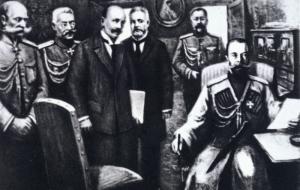
March 16, 1917
Two authorities function simultaneously in Petrograd – Provisional Government and Petrograd Soviet of Workers' and Soldiers' Deputies. The message that Nicolas II has abdicated is spreading across the country. Grand Duke Michael Alexandrovich, in whose favour Nicolas II had abdicated, refuses to take the throne upon consulting with the members of the Provisional Committee of the State Duma and Provisional Government, leaving it to the Constituent Assembly to decide on the future structure of the country.
Mutiny in the Baltic fleet and killing of officers, which started yesterday in Kronstadt, are spreading to Helsingfors.
Moscow Newsletter
Apartment robbery
Yesterday, a car with five armed man arrived to 25, Malaya Dmitrovka street.
One of them called a yard-keeper and ordered him to show him the location of apartment #3, having introduced himself as a representative of the Revolutionary Committee. The man entered the apartment together with the yard-keeper and hearing from a housemaid that masters are out he took out a revolver and demanded to show weapons allegedly hidden in the flat. Despite all assurances from the housemaid that there were none, he used his keys and picklocks to open up cupboards and tables. He took all valuables and a substantial sum of several thousand rubles; together with the street sweeper he walked by a doorkeeper to escape the scene with his accomplices who waited for him on the street.
It goes without saying that the robbers in disguise had nothing to do with the Revolutionary Committee.
March 17, 1917
Newspapers, those which still function, continue to publish manifests on the abdication of Emperor Nicolas II and Grand Duke Michael Alexandrovich. General Mikhail Alexeyev delivered a request to the Provisional Government from the former Emperor Nicolas II to allow the latter to reunite with the family in the residency at Tsarskoye Selo. Prince Georgy Lvov, Minister-Chairman of the Russian Provisional Government, sends a telegram to all military and civil authorities of Russia that reads that the absolute power now is in the hands of the Provisional Government.
The Extraordinary Commission for the investigation of illegal actions of former high official is formed in Kiev, the Central Council of Ukraine starts its work – it is a new representative body that has united all nationalist forces of Ukraine.
Moscow Newsletter
For insulting the revolutionary flag
A State Counsellor and a customs official were arrested in the Nikolaevskaya square and taken to the Council for insulting the revolutionary flag. Also, two detective constables were identified in crowd and arrested.
***
In the court
Today, Magistrates Court and Appellate Court have been omitting the phrase “upon the decree of His Imperial Majesty” when announcing the resolution “the court has ruled.”
***
Your Excellency, Commissar of Moscow, barbers and hairdressers send their regards,
Moscow haircutters solemnly welcome the first citizen of the free Russia and Chairman of the State Duma, and would like to express our infinite joy and happiness on the fact that the craftsmen will finally see the justice and positive changes in the Great Russia.
Haircutters and proud citizens of Moscow
March 18, 1917
The publishing of newspapers is once again renewed after it was suspended for some time during the revolution.
Notes from the governments of Great Britain, France and Italy have arrives to Petrograd informing on the de-facto recognition of the Provisional Government (the decision was made after discussions prompted by doubts over the position of the Provisional Government on the continuation of war)
The Holy Synod has banned the proclaiming of “long live the Emperor” in all churches of Petrograd eparchy.
The Petrograd Newsletter
Authorities do what they can to restore the operation of trams by March 20.
In the beginning, the trams will circulate only until 7 o’clock in the evening.
Head of the city police stated in his first order that the police need weapons to perform their duty, thus the residents should turn in any weapons whey have to the State Duma. People of Moscow has answered that call, and throughout yesterday there was an undying flow of weapons of various kinds to the Duma and by the evening the arsenal had been filled to capacity.
***
Fighting alcohol abuse
City’s authorities discussed possible ways to tighten the rules on the procurement of pure alcohol and alcohol-containing drops. Pharmacies will now release alcohol only when presented with a relevant permit from district commandant. In addition to that, the head of the city police has been instructed to take most effective measure to ensure the security of alcohol and wine warehouses.
***
Moscow Newsletter
Shops closing
Yesterday, most shops were closed in the celebration of a parade of the revolutionary forces and funerals of the victims of the revolution
***
Cinematographics
Yesterday, on the occasion of the festivities on the Red Square, Cinematographic Department of the Soviet of Workers' Deputies caught on tape many remarkable moments of that historic day. Profit from the demonstration of films will be allocated in full for revolutionary needs.
March 19, 1917
Provisional Government confirmed its commitment to Russia’s agreements with the allies and its intention to continue the war till final victory.
A massive rally demanding autonomy for Ukraine is taking place in Kiev.
Governmental crisis in France. Aristide Briand resigns as prime-minister. Alexandre Ribot is tasked with forming a new cabinet.
The Synod “takes under advisement” abdication announcements from Nicholas II and Grand Duke Michael Alexandrovich of Russia. The churches now include the “Many years to Russia and its Provisional Government” prayer into their daily services.
The Moscow Newsletter
Improving Food Situation in Moscow
According to the Executive Committee of the public organizations, food supply to Moscow constantly improving. A lot of supplies arrived to the markets yesterday. A large supply of flour is expected shortly.
All arriving goods are registered and will be listed in relevant bulletins.
***
The Petrograd Newsletter
Russian Ruble Getting Stronger in France
Just like general public and political circles, financial and business circles in France have full confidence in the new political order in Russia, which stimulated growth of Russian shares and currency on the Paris stock exchange yesterday and today.
***
Millions in Prince Oginski’s Will
It is reported that Prince Oginski’s original will that had been reportedly procured by some of the heirs and submitted for approval burned in the recent courthouse fire.
The entire Oginsky case file burned with the court archive, and the newly discovered will burned together with the court clerk’s office.
March 21, 1917
In accordance with the Provisional Government decree ordering imprisonment of the former Emperor of Russia Nicholas II and his family, the new commander of the Petrograd Military District General Lavr Kornilov arrested the royal family in Tsarskoye Selo. Reinforced patrol was assigned by the Petrograd Military District headquarters to secure the perimeter of the residence.
Provisional Government Commissar Alexey Bublikov in charge of a special commission arrived to Mogilev with a detachment of soldiers to make an arrest of the former emperor kept at the time at the Supreme Commander-in-Chief’s General Headquarters. Before being further transported to Tsarskoye Selo, Nicholas II issued his last order to the troops, which remained unpublished.
The Petrograd Newsletter
Trams are Back
The tram service was restored with appropriate festivities.
The first tram in the convoy, that gave a ride to the tram service administration, carried a red flag saying: "Land and Freedom. Long live the Republic!” The trailing tram carried an orchestra playing the Marseillaise.
The trams made a stop by the Kazan Cathedral for tram conductors to join the prayer for the fallen in the struggle against the autocracy, after which a few welcoming speeches were made, and the conductors went on with their duties, shouting "Hurrah!"
***
The products (bread, flour, sugar, fat and meat) will only be distributed among the population via the food stamp system. Prior to introducing the food stamp system, a census of the population by consumer category will be conducted.
Every residence should arrange a committee to authorize one representative. This representative shall collect and double-check all data about the residents.
Previous-issue food stamps for sugar are still in circulation; new ones are expected to come out on April 1. Food stamps for bread have already been prepared. Each slip will have 15 coupons for bread (one coupon for 2 days) and 4 coupons for the flour (one coupon per week). To save sugar, the Committee decided to introduce control of all the sugar used at all sweet shops. Production of candies and sweets is effectively put on hold. Only production of dry chocolate will continue, as it is in great demand at the front.
March 24, 1917
France, Britain and Italy officially recognized the Provisional Government. Provisional Government has ordered cremation of the body of Grigory Rasputin that was recently exhumed from the grave in the Alexander Park in Tsarskoye Selo. Rasputin’s body was burned in the boiler room of the Polytechnic Institute in St. Petersburg, the procedure was officially put on record.
The Petrograd Newsletter
Theatre Courier
Theaters open in Petrograd today. The majority of privately-run theaters donated the proceeds from the first show to the victims of the Revolution or to the Provisional Government.
The union of playwrights decided to run an inside poll among the authors themselves in order to establish how many and what plays were prohibited by the previous-regime censorship and therefore had never been staged.
This is all the more timely as theaters indeed are in much need of updating their repertoire that would be free of the limitations previously imposed by the censorship.
***
Arrival of Bishop Vladimir
Bishop Vladimir of Penza arrived to Petrograd. While visiting the capital he took up a simple routine: he rides a tram, and one can see a copy of the “News of the Workers’ Council” or “Soldiers’ Deputies” newspaper in his hands.
***
Residential Cooperative Stores
In view of the recent events in Petrograd, residential cooperative stores are introduced to provide supplies only to the registered residents of each house.
March 29, 1917
Provisional Government officially recognized Poland’s right to independence and reunification of all Polish territories that were part of the Russian, German and Austro-Hungarian Empire.
A celebration of the “Day of Revolution” took place in Kiev that included demolition of the monument to Peter Stolypin accompanied by mass rallies and a mock-court theatrical performance.
The Petrograd Newsletter
Mysterious Affair
Many young women whose trade lies in striking acquaintance with men in the streets, train stations and cafes took residence in the Svechnoy Alley. Until recently they’d been frequented by soldiers of Petrograd and Kronstadt garrisons.
The women welcomed them cordially, sometimes even offered them wine and then started talking about how nice it would be to have some photographs of the soldiers that had to do with their everyday life on duty or personal life.
The next time soldiers came, they brought photographs, though there were no classified images among them. This strange collection raised certain questions and came to the attention of local police. Two nights ago policemen and military patrol surrounded the apartments where the women in question resided and thoroughly searched all the rooms, discovering a large number of photographs of non-family-friendly nature and several letters, the content of which remains unclear. The women gave implausible excuses and have been detained until the circumstances clear up.
***
Cocaine Dealer Arrested
A notorious drug dealer known as Shurka Moskovsky was arrested yesterday in Ampir café on Sadovaya Street. He continued his illegal trade under the new regime, landing in jail once again.
-
1 March
-
6 March
-
7 March
-
8 March
-
11 March
-
15 March
-
16 March
-
17 March
-
18 March
-
19 March
-
21 March
-
24 March
-
29 March